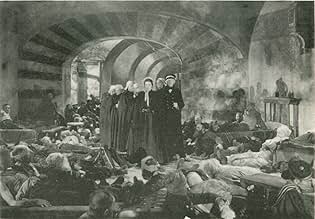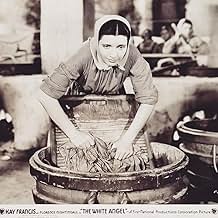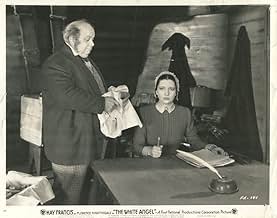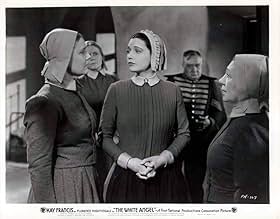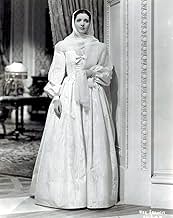NOTE IMDb
6,6/10
445
MA NOTE
Ajouter une intrigue dans votre langueA look at the life of Florence Nightingale.A look at the life of Florence Nightingale.A look at the life of Florence Nightingale.
- Réalisation
- Scénario
- Casting principal
- Récompenses
- 2 victoires et 1 nomination au total
Lillian Kemble-Cooper
- Parthenope 'Parthe' Nightingale
- (as Lillian Cooper)
Avis à la une
... in that the only reason I can figure this film is legendary as a bomb is that Kay Francis was not accepted in her role just as Clark Gable was not accepted at the time in Parnell.
Francis was normally the leading lady in sparkling romantic comedies, her most prolific years being the precode ones. She also played the tragic figure in romantic dramas where she might sacrifice to protect a child, or she was misunderstood and believed to be unfaithful and ostracized, or was partnered up with an abusive man. But playing 19th century pioneering nurse Florence Nightingale? This was a complete departure and would be as odd as seeing Errol Flynn play Abraham Lincoln.
Plus Kay doesn't project much genuine emotion during the film. Somebody Florence might have married had she taken the conventional path dies right before her eyes and ... nothing? No tears? Since director Dieterle also directed Paul Muni in The Story of Louis Pasteur the year before, there is no explanation for what happened here.
This film actually didn't bomb, but it was the beginning of the end of Kay at Warner Brothers as her relationship with Jack Warner quickly deteriorated and he realized that Bette Davis was the studio's female star of the present and future.
One thing the film did particularly poorly - All of those intertitles! Some of them are so busy it is like reading a book. Eight years past the transition to sound and this device had been largely abandoned as directors learned to change scenes without it.
This one is worth your time if you forget your preconceived notions about its classification as a bomb and just give it a fair chance.
Francis was normally the leading lady in sparkling romantic comedies, her most prolific years being the precode ones. She also played the tragic figure in romantic dramas where she might sacrifice to protect a child, or she was misunderstood and believed to be unfaithful and ostracized, or was partnered up with an abusive man. But playing 19th century pioneering nurse Florence Nightingale? This was a complete departure and would be as odd as seeing Errol Flynn play Abraham Lincoln.
Plus Kay doesn't project much genuine emotion during the film. Somebody Florence might have married had she taken the conventional path dies right before her eyes and ... nothing? No tears? Since director Dieterle also directed Paul Muni in The Story of Louis Pasteur the year before, there is no explanation for what happened here.
This film actually didn't bomb, but it was the beginning of the end of Kay at Warner Brothers as her relationship with Jack Warner quickly deteriorated and he realized that Bette Davis was the studio's female star of the present and future.
One thing the film did particularly poorly - All of those intertitles! Some of them are so busy it is like reading a book. Eight years past the transition to sound and this device had been largely abandoned as directors learned to change scenes without it.
This one is worth your time if you forget your preconceived notions about its classification as a bomb and just give it a fair chance.
It's very melodramatic, reminding me of Young Tom Edison. Every "tidbit" the average person knows about the famous person is included in the script, in the most saccharine-style possible. Months after she sits up all night with Billy Mauch when he's ill, he finds her sitting in the snow. "I'm taking care of you now," he says as he gives her his coat. There are countless scenes like that one, as costars who play coworkers of Florence Nightingale praise her selflessness and dedication to her patients. In another scene, she comes down with cholera, and rather than letting the medical staff carry her away on a stretcher, the soldiers in the trench insist on doing it. That's fine, but one soldier actually says, "We'll do it! Who cares about cholera?" Way too corny for my taste.
But, if that's why you're watching the movie, you might not mind the style. I minded, because I was hoping for a more historical approach as to why she became a nurse, rather than just scene after scene of her forgoing sleep in order to sit up with a sick patient. There's a little portion of the beginning that shows her decline a marriage proposal in favor of medical school, but it's not very explanatory. There is a large supporting cast, though, including Henry O'Neill, Ian Hunter, Halliwell Hobbes, Nigel Bruce, Donald Crisp, Donald Woods, Fay Holden, and E. E. Clive. Watch at your own risk, and only if you like dated biopics.
But, if that's why you're watching the movie, you might not mind the style. I minded, because I was hoping for a more historical approach as to why she became a nurse, rather than just scene after scene of her forgoing sleep in order to sit up with a sick patient. There's a little portion of the beginning that shows her decline a marriage proposal in favor of medical school, but it's not very explanatory. There is a large supporting cast, though, including Henry O'Neill, Ian Hunter, Halliwell Hobbes, Nigel Bruce, Donald Crisp, Donald Woods, Fay Holden, and E. E. Clive. Watch at your own risk, and only if you like dated biopics.
Kay Francis stars in this biopic of Florence Nightingale. I love old Hollywood biopics. They get a lot of flack today by certain types for embellishing some facts of these people's lives. Seems to me biopics today have even worse flaws. Instead of embellishing positively they embellish negatively. In other words, instead of focusing on inspiring uplifting strengths and virtues they focus on the faults and vices of historical figures. To each their own but personally I will take the rousing biographical films from back then over the salacious and often slanderous ones of the modern era.
Rant aside, this is not the strongest biopic but it is a decent one. Kay Francis works against type quite well. She's helped by an amazing supporting cast. To name a few: Donald Crisp, Nigel Bruce, Donald Woods, Henry O'Neill, Ian Hunter, Halliwell Hobbes -- they all give first rate support.
Overall it's an entertaining film. I recommend it to people who are interested In the story of Florence Nightingale and anybody who enjoys Golden Age of Hollywood biographical dramas.
Rant aside, this is not the strongest biopic but it is a decent one. Kay Francis works against type quite well. She's helped by an amazing supporting cast. To name a few: Donald Crisp, Nigel Bruce, Donald Woods, Henry O'Neill, Ian Hunter, Halliwell Hobbes -- they all give first rate support.
Overall it's an entertaining film. I recommend it to people who are interested In the story of Florence Nightingale and anybody who enjoys Golden Age of Hollywood biographical dramas.
With a title like The White Angel, you kind of know what you're going to get, if you'll excuse the pun, a whitewash. Of course a person like Florence Nightingale should be celebrated for her achievements but this film presents her as a saint rather than a living, breathing and flawed human being. Again, no joke intended but the characters for her are depicted as heroic and those against her, villainous, so, rather black and white. A more serious biopic might have been entitled The Lady With the Lamp and indeed a passage of the film where various characters read out Longfellow's poem of the same name is one of the most effective and moving scenes of the film. German director, William Dieterle, known for many great movies such as the beloved 1939 version of The Hunchback of Notre Dame and more significantly, for me, 1941's masterpiece, The Devil and Daniel Webster, is a sure hand on the tiller and moves things along with pace and interest but is fighting a battle with the script. The best you can say of it, is it is of it's time. The worst affected is the star, Kay Francis, a fine actress who delivers with conviction but is encumbered with po faced and twee lines that beggar belief. Her talent is evident in that she still manages to make her role engaging. Fortunately, she also has a sterling cast to play alongside her; on the 'good' side the redoutable Halliwell Hobbes brings charisma in spades as Lord Raglan and Ferdinand Munier is enjoyably whimsical as the camp cook, Soyer. On the distaff side, Donald Crisp is effectively cold as Dr Hunt, Montagu Love, suitably oily as Bullock and Nigel Bruce, my reason for watching, is hugely pleasurable to watch as the pompous and condescending Dr West, and unlike the other two antagonists, manages to be likeable into the bargain. All three represent the crushing patriarchy that our heroine needs to overcome both in England and the Crimea. Striking a false note is Billy Mauch as drummer boy, Billy, so very American and so very twee that his appearances jar and take you out of the story. Talking of twee, the appearance of Queen Victoria's arm and her arm only, takes the biscuit! But to conclude at an hour and a half with first rate acting and direction this is a good biopic and with a stronger script could have been a excellent one.
I come from a family of nurses, so I watched this film with interest.
Kay Francis plays Florence Nightingale, the founder of modern nursing. Mostly the film covers her work in the Crimea.
This is a typical '30s movie - Nightingale meets with a great deal of resistance, which she probably did in real life. The villains here are somewhat cliched in their nastiness and refusal to help her make any progress. A typical good vs. Evil fight.
I read a lot of criticism about Kay Francis - this was an unusual role for her, where she's not playing a woman of the world. I thought she portrayed a quiet strength and dignity.
Someone said Bette Davis would have been better. Bette Davis was wonderful, but I didn't feel Nightingale needed a fiery portrayal. As far as criticism of Francis, Francis' interpretation was correct in that she was well-educated and came from a wealthy family.
Granted she's portrayed as a saint, but that's the fault of the script. I do believe that Nightingale, given her upbringing, was a strong and determined woman who used a velvet glove rather than an iron hand.
I found the film very absorbing and poignant.
Kay Francis plays Florence Nightingale, the founder of modern nursing. Mostly the film covers her work in the Crimea.
This is a typical '30s movie - Nightingale meets with a great deal of resistance, which she probably did in real life. The villains here are somewhat cliched in their nastiness and refusal to help her make any progress. A typical good vs. Evil fight.
I read a lot of criticism about Kay Francis - this was an unusual role for her, where she's not playing a woman of the world. I thought she portrayed a quiet strength and dignity.
Someone said Bette Davis would have been better. Bette Davis was wonderful, but I didn't feel Nightingale needed a fiery portrayal. As far as criticism of Francis, Francis' interpretation was correct in that she was well-educated and came from a wealthy family.
Granted she's portrayed as a saint, but that's the fault of the script. I do believe that Nightingale, given her upbringing, was a strong and determined woman who used a velvet glove rather than an iron hand.
I found the film very absorbing and poignant.
Le saviez-vous
- AnecdotesMuch disagreement to the origin of the source material exists. Some contemporary sources believed the source was Lytton Strachey's 1918 biographical essay in "Eminent Victorians". Others contend Michael Jacoby was the author. Warner Bros. executive Hal B. Wallis contended that the life of Florence Nightingale was in the public domain, and that screenwriter Mordaunt Shairp did his own research. The MPAA agreed with Wallis; no source credit was necessary.
- GaffesWhen Florence is receiving the news on the steps of the hospital of the sinking of the French transport, the shadow of the boom microphone moves onto then quickly off her left sleeve.
- Crédits fousPrologue: Towards the year 1850, England was at peace with the world. Her men were following her ships to the four corners of the earth, building the great empire that is Queen Victoria's monument. Women were only permitted to nod meek approval. In all England, only Her Majesty had the right to express herself with the independence of a man.
- ConnexionsFeatured in Breakdowns of 1936 (1936)
- Bandes originalesAuld Lang Syne
(uncredited)
Traditional
Lyrics by Robert Burns
Incorporated into the score at the new year
Sung by the crowd celebrating the new year
Meilleurs choix
Connectez-vous pour évaluer et suivre la liste de favoris afin de recevoir des recommandations personnalisées
Détails
- Date de sortie
- Pays d’origine
- Langue
- Aussi connu sous le nom de
- The White Angel
- Lieux de tournage
- Sociétés de production
- Voir plus de crédits d'entreprise sur IMDbPro
- Durée
- 1h 32min(92 min)
- Couleur
- Mixage
- Rapport de forme
- 1.37 : 1
Contribuer à cette page
Suggérer une modification ou ajouter du contenu manquant



